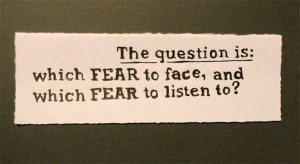Comfort and Avoiding the Flinch
 We all strive for "the good life" it seems like. The American Dream. We try and find that job that we can clock in and clock out, pay the bills and eventually be able to live the easy life. Is there anything wrong with that?
We all strive for "the good life" it seems like. The American Dream. We try and find that job that we can clock in and clock out, pay the bills and eventually be able to live the easy life. Is there anything wrong with that?
Not necessarily. Comfort is a good thing. It makes all the hard work worthwhile when everything is said and done. There is a balance in achieving and really enjoying those comfort moments and staying in those comfortable moments to the point of our detriment.
On a plane ride back home last week I finished up "The Flinch" by Julien Smith. He talks about how we are all given that natural reflex, "The Flinch," that protects us from danger. It's a helpful thing...but has taken a larger role in most of our lives than we think. Julien says that the flinch helps us from avoiding simply "uncomfortable" situations more often than it does protecting us from legitimate danger. The main point of the book is that when we avoid that discomfort, we fail to grow and really live. I believe that.
Discomfort Is A Good Thing
Not long ago Michael Hyatt posted in his blog his thoughts about why we should embrace discomfort. He draws his inspiration from Dean Karnazes with his quote (that is also in Hyatt's post):
"Western culture has things a little backwards right now. We think that if we had every comfort available to us, we’d be happy. We equate comfort with happiness. And now we’re so comfortable we’re miserable. There’s no struggle in our lives. No sense of adventure. We get in a car, we get in an elevator, it all comes easy. What I’ve found is that I’m never more alive than when I’m pushing and I’m in pain, and I’m struggling for high achievement, and in that struggle I think there’s a magic."
It's facing that discomfort, those moments of insecurity head on that we grow. I remember running cross country and track in high school and college, it was the painful runs that made me better. I remember going through all my classes with this nagging fear in the back of my mind about how that's afternoon's workout was going to hurt. However, the more I stared that pain in the face, the faster I got. Along with that, I went from being intimidated by almost everybody on my team and not making the team one year to being a vital scorer the next.
Now, I've been blessed with a job where you can't afford to be comfortable. As many of you who read this blog and also work in digital, you know it's a rapidly moving place. You can't rest on your laurels but have to keep looking ten steps ahead, trying new methods, testing new platforms and not being afraid of failure is something we have to face every day. Throw in challenges with client needs, being knee deep in work and having those days where "things just aren't going right for me", it's a job that makes me face discomfort...but in a good way. It's a place that helps me grow and where I have a lot of encouragement and pushing from the people around me every day.
How To Work Through That Wall of Discomfort
In "The Flinch," Julien suggests exercises like taking a coffee mug and shattering it on the floor or taking a cold shower. Some people do it through exercise (something I try to do). Other ways I do it is something random like playing ping pong at work, especially those much better than I. Being down my a lot of points is discouraging and not being "the best" is not in my comfort zone. However, keeping my head down and not giving up helps me not mentally back down and keep playing like I still have a chance. Another way is trying to get rid a lot of my own personal items like clothes, movies etc that I don't really need and looking at what is really "necessary" to have around our apartment. I'm hoping these simple exercises have a positive carryover to other parts of my life.
I know that you shouldn't take a risk for the sake of taking a risk but sometimes there are risks and uncomfortable situations that really help us grow.
Does "The Flinch" hold you back from reaching your potential? What do you to to face fear and uncertainty (no matter how big or small)?
The Flinch is a book part of Seth Godin's Domino Project. You can download it for free here.


